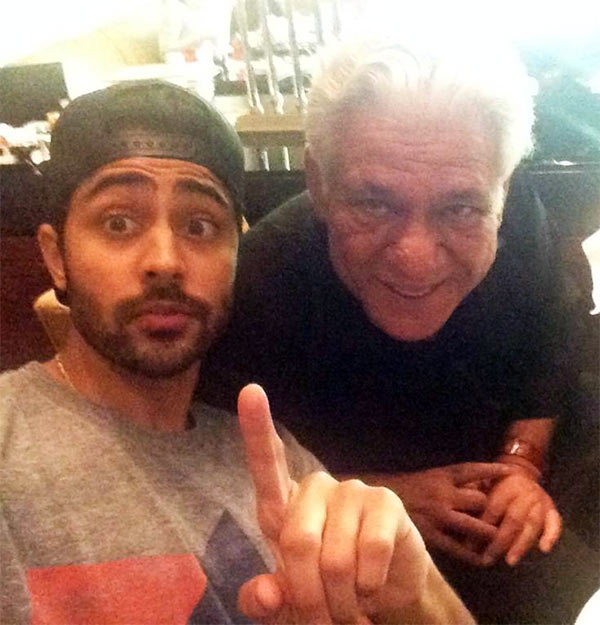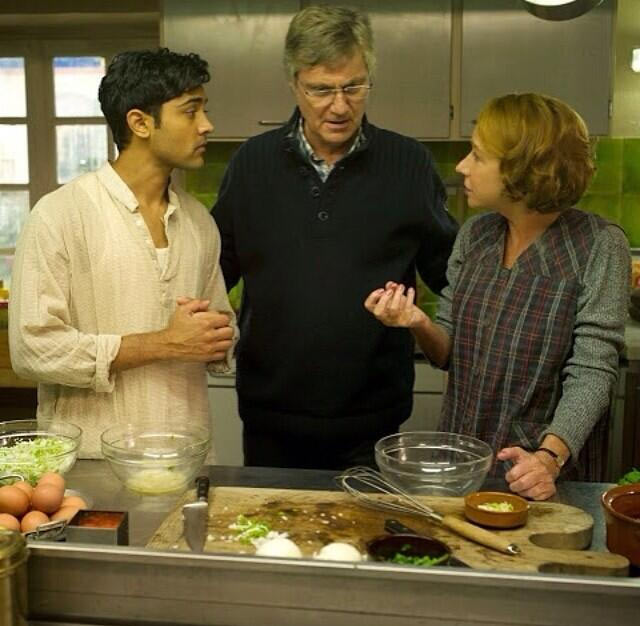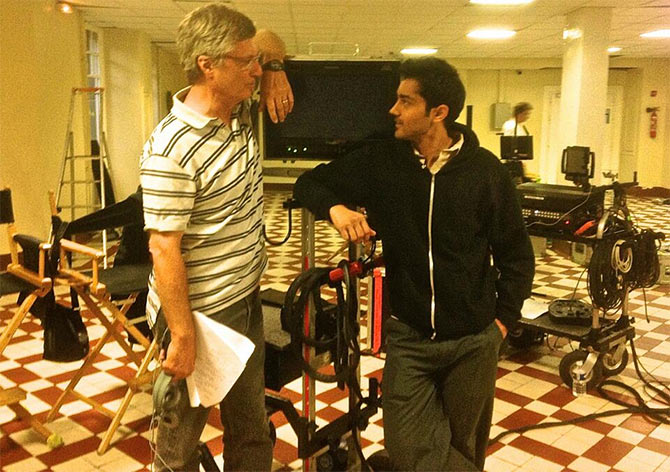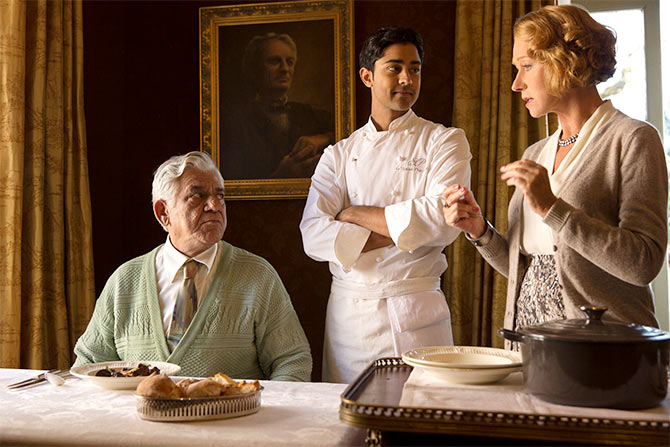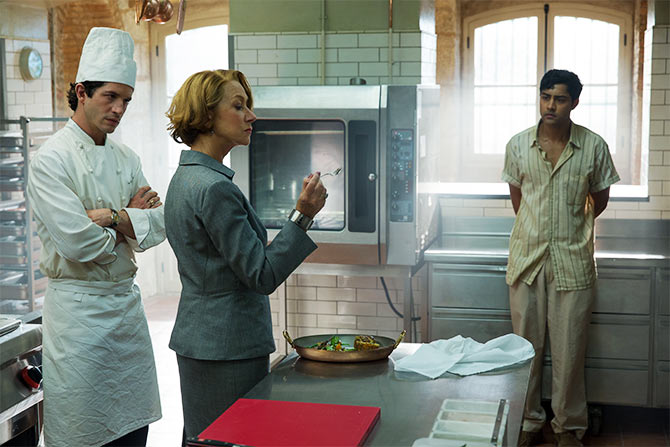 | « Back to article | Print this article |
'Anything could happen when you are acting with Om Puri'
'One take may be completely different than the one before. That's why he keeps you on your toes... Every time I was with him I was learning something,' Indian-American actor Manish Dayal tells Aseem Chhabra/Rediff.com
Manish Dayal is a New York-based Indian-American actor who until recently had acted in a number of indies, television shows as well as one well received off-Broadway play, Rafta, Rafta, written by British Pakistani playwright Ayub Khan-Din.
Then, by sheer luck and also a lot of hard work (he auditioned for four months), he landed the part in a Dreamworks production The Hundred-Foot Journey about a young Indian cook, Hassan, who migrates to Europe with his father and siblings in search of opportunities to open an Indian restaurant.
In Lasse Hallstrom's film, The Hundred-Foot Journey, the Indian eatery opens in a small French village right across a Michelin-starred classic French restaurant run by a rather difficult woman Madame Mallory (although she has a very warm heart), played by Oscar winner Helen Mirren.
Hassan gets interested in the world of French cuisine and wins over her by cooking her an Indian style omelet.
Dayal is fantastic in the film and has some wonderful scenes with Mirren and Om Puri, who plays his father.
Congratulations on the film, Manish. You have a real movie star-like presence. Tell me, do you cook?
I do a little bit now, but I wouldn't say I was much of a cook before this film.
So what do you cook?
I can make a great omelet. I can make egg curry. Those are things I can do well. I should probably just stick to that.
Please click Next to see more...
'The Indian kitchen is about getting the job done anyway you can'
And did you watch the omelet being cooked for the film?
That omelet is what my dad used to make for me growing up. That's what makes my character unique in that he has the ability to change recipes and make them more specific to himself. And so I changed the omelet from a more traditional French one to one that is more Indian. That's part of what my character Hassan does.
Was that an Indian masala omelet?
Yes, there was Indian masala and a little bit of cardamom and other things my dad used to add, including milk.
And how many omelets did you have to make for that scene?
We must have made about 13.
Did Helen Mirren eat them each time?
Na, not all of them. She liked it though.
What about all the French cooking you do in the second half of the film and all the knives? Did you have to learn to use them? You are an actor, of course, but you had to appear very natural and comfortable.
There was a lot of pre-production for the film and so I was able to visit many kitchens in France and also Indian kitchens. I was able to learn from the people they had on board to teach me some of the technical stuff about the kitchen, chopping and preparation.
I learned about the hierarchy in the French kitchen -- how everybody has a specific job. The Indian kitchen is about getting the job done anyway you can. Those are two very different kitchen cultures.
But my character defined what I had to learn. How a French chef would garnish a fish is different than how Hassan would garnish it.
Please click Next to see more...
'Lasse Hallstrom's vision is always changing and evolving'
How did you get the role?
I got the part because I went to read for another project -- an animation film. But the head of casting for this film was in the room. That night I got a call to come back and read for something else. They wouldn't tell me what it was for.
I was reading for four months and meeting people at Dreamworks. Finally, they told me and I read the book and met the director.
What your first few meeting like with Lasse Hallstrom?
It was awesome. He told me to pick an Indian restaurant. I took him to Copper Chimney in Curry Hill in New York City. He is vegan and I had to make sure I ordered the right thing. I ordered eggplant for him.
Lasse has made some remarkable films. What is he like as a director?
He is very imaginative. His vision is always changing and evolving. He would make things better for the actors, but he was never fixed to any idea. It was a collaborative effort and nothing was impossible for him.
You are of Indian origin, but you were born and brought up in the US. Here was a role of an Indian guy directly from India. How did you bring the Indian ethos in your character?
In order to play the authenticity of this character -- and he had not lived in America as I had -- for me it was a lot about observation. It was not about mimicking, but incorporating it in this person.
He is from India and I had to watch and think about how a new Indian in Europe would talk. There is something less aggressive about an Indian compared to an American.
One of the problems that happen in such films is that often the Indian characters become caricatures. I was happy that it wasn't so in this film. A lot of Slumdog Millionaire, I think, had that.
That didn't happen here. I was very, very aware of that and so was Om ji (Om Puri). We talked about it, because this is not a film about a minority being saved by a majority.
This is a story about people who have to pull up by their bootstraps so they get the job done themselves. They are not knocking on anyone's door for help. They are doing their own business.
It is what, I think, is the immigrant experience, what my dad had to do when he first came to this country.
That's why I think this film can stay away from stereotypes. I think this movie also goes beyond cultural and racial limitations. It shows you the human experience rather than just the immigrant one.
Please click Next to see more...
'Om Puri keeps you on your toes'
You mentioned Omji -- so between Omji and Helenji you worked with two of the greatest actors of our time.
Oh yes, two jis (laughs).
As actors, how do they work, and especially with a younger and relatively new actor like you?
Om Puri, I can say, has become one of my greatest friends. He is mischievous. He is a rascal and plays a lot of pranks. He is very improvisational.
Anything could happen when you are acting with Om Puri. One take may be completely different than the one before. That's why he keeps you on your toes.
What's interesting is that he comes from the Bollywood tradition and that completely doesn't work here.
He is classically trained and he has great respect for acting. So he doesn't work at all like what you would imagine a Bollywood actor might do so. Every time I was with him I was learning something.
Please click Next to see more...
'Helen Mirren is really cool'
You also had some very special scenes with Helen Mirren.
Oh yes, working with her was amazing too. She's very down to earth and she has a great sense of humour. The first day I arrived in France she and I ended up having a two-hour dinner.
I was sitting by myself drinking a beer, reading the script and she came out and joined me. She talked a lot and I learned a lot about her. She told me about her acting and how she started.
On the set, she treated everybody like an equal.
That's an interesting thing you observed. I would imagine that actors in Europe do not believe in hierarchy.
I mean definitely not with Helen. She's not like that. She is really cool and has a wicked sense of humour.
Was there a moment when she worked with you on a scene, given her years of experience?
We tried the omelet scene in many different ways. We played around with the way I was including the ingredients.
Please click Next to see more...
'Oprah spoke to us about why she was drawn to this project'
What about your two big producers? Did you meet them?
(Steven) Spielberg was my hero from childhood since I saw Jurassic Park. That's how I developed an interest in the film business. I met Steven when the movie wrapped up.
Oprah came to visit us during the shoot. She spoke to us about why she was drawn to this project, since it is about a family that overcomes all of its obstacles.
So, Manish, this is a huge break. What do you expect from it and how it will impact your career as an Indian-American actor?
I am just excited about the future and what's going to happen. As far as being an Indian actor in America, I am happy to explore what the other opportunities are and see what other spaces we can occupy.
